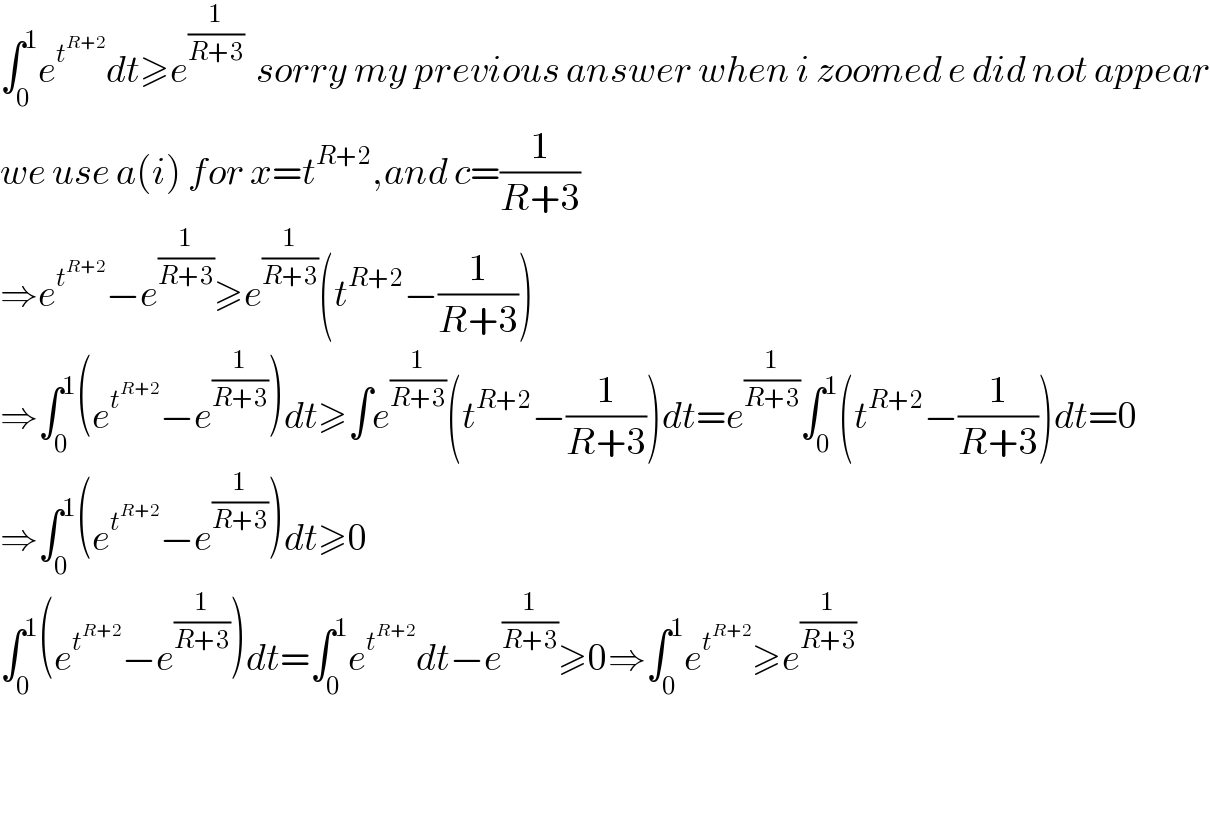Question Number 73730 by TawaTawa last updated on 15/Nov/19

Answered by mind is power last updated on 15/Nov/19

$${f}\left({x}\right)={e}^{{x}} −{e}^{{c}} −{e}^{{c}} \left({x}−{c}\right) \\ $$$$\Rightarrow{f}'\left({x}\right)={e}^{{x}} −{e}^{{c}} \Rightarrow\begin{cases}{{f}\left('{x}\right)\geqslant\mathrm{0},\forall{x}\geqslant{c}}\\{{f}'\left({x}\right)\leqslant\mathrm{0},\forall{x}\leqslant{c}}\end{cases} \\ $$$$\Rightarrow{min}\:{f}={f}\left({c}\right)=\mathrm{0}\Rightarrow\forall{x}\in\mathbb{R},{f}\left({x}\right)\geqslant\mathrm{0}\Leftrightarrow{e}^{{x}} −{e}^{{c}} \geqslant{e}^{{c}} \left({x}−{c}\right) \\ $$$$\int_{\mathrm{0}} ^{\mathrm{1}} {e}^{{t}^{{R}+\mathrm{1}} } {dt} \\ $$$${we}\:{have}\:{for}\:{c}=\mathrm{0}\Rightarrow{e}^{{x}} −\mathrm{1}\geqslant\mathrm{1}\left({x}−\mathrm{1}\right)\Leftrightarrow{e}^{{x}} \geqslant{x},{x}={t}^{{R}+\mathrm{2}} \\ $$$$\Rightarrow{e}^{{t}^{{R}+\mathrm{2}} } \geqslant{t}^{{R}+\mathrm{2}} \\ $$$$\Rightarrow\int_{\mathrm{0}} ^{\mathrm{1}} {e}^{{t}^{{R}+\mathrm{2}} } \geqslant\int_{\mathrm{0}} ^{\mathrm{1}} {t}^{{R}+\mathrm{2}} =\frac{\mathrm{1}}{{R}+\mathrm{3}} \\ $$
Commented by TawaTawa last updated on 15/Nov/19

$$\mathrm{God}\:\mathrm{bless}\:\mathrm{you}\:\mathrm{sir} \\ $$
Commented by mind is power last updated on 15/Nov/19

$${y}'{re}\:{welcom}\:{sir} \\ $$
Answered by mind is power last updated on 15/Nov/19

$$\int_{\mathrm{0}} ^{\mathrm{1}} {e}^{{t}^{{R}+\mathrm{2}} } {dt}\geqslant{e}^{\frac{\mathrm{1}}{{R}+\mathrm{3}}} \:\:{sorry}\:{my}\:{previous}\:{answer}\:{when}\:{i}\:{zoomed}\:{e}\:{did}\:{not}\:{appear} \\ $$$${we}\:{use}\:{a}\left({i}\right)\:{for}\:{x}={t}^{{R}+\mathrm{2}} ,{and}\:{c}=\frac{\mathrm{1}}{{R}+\mathrm{3}} \\ $$$$\Rightarrow{e}^{{t}^{{R}+\mathrm{2}} } −{e}^{\frac{\mathrm{1}}{{R}+\mathrm{3}}} \geqslant{e}^{\frac{\mathrm{1}}{{R}+\mathrm{3}}} \left({t}^{{R}+\mathrm{2}} −\frac{\mathrm{1}}{{R}+\mathrm{3}}\right) \\ $$$$\Rightarrow\int_{\mathrm{0}} ^{\mathrm{1}} \left({e}^{{t}^{{R}+\mathrm{2}} } −{e}^{\frac{\mathrm{1}}{{R}+\mathrm{3}}} \right){dt}\geqslant\int{e}^{\frac{\mathrm{1}}{{R}+\mathrm{3}}} \left({t}^{{R}+\mathrm{2}} −\frac{\mathrm{1}}{{R}+\mathrm{3}}\right){dt}={e}^{\frac{\mathrm{1}}{{R}+\mathrm{3}}} \int_{\mathrm{0}} ^{\mathrm{1}} \left({t}^{{R}+\mathrm{2}} −\frac{\mathrm{1}}{{R}+\mathrm{3}}\right){dt}=\mathrm{0} \\ $$$$\Rightarrow\int_{\mathrm{0}} ^{\mathrm{1}} \left({e}^{{t}^{{R}+\mathrm{2}} } −{e}^{\frac{\mathrm{1}}{{R}+\mathrm{3}}} \right){dt}\geqslant\mathrm{0} \\ $$$$\int_{\mathrm{0}} ^{\mathrm{1}} \left({e}^{{t}^{{R}+\mathrm{2}} } −{e}^{\frac{\mathrm{1}}{{R}+\mathrm{3}}} \right){dt}=\int_{\mathrm{0}} ^{\mathrm{1}} {e}^{{t}^{{R}+\mathrm{2}} } {dt}−{e}^{\frac{\mathrm{1}}{{R}+\mathrm{3}}} \geqslant\mathrm{0}\Rightarrow\int_{\mathrm{0}} ^{\mathrm{1}} {e}^{{t}^{{R}+\mathrm{2}} } \geqslant{e}^{\frac{\mathrm{1}}{{R}+\mathrm{3}}} \\ $$$$ \\ $$$$ \\ $$
Commented by TawaTawa last updated on 15/Nov/19

$$\mathrm{Thanks}\:\mathrm{for}\:\mathrm{your}\:\mathrm{time}\:\mathrm{sir}.\:\mathrm{God}\:\mathrm{bless}\:\mathrm{you}. \\ $$
Commented by mind is power last updated on 15/Nov/19

$${y}'{re}\:{welcom} \\ $$
